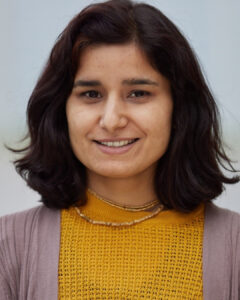Sheetal Davi’s Interview
Starting date: 06.09.2022
Nationality : Indian
Implementing Partner : Jülich Center for Neutron Science
Main supervisor: Dr Yixi Su

Few words about you and your research project
Namaste!
I am Sheetal, and I recently joined Jülich Center for Neutron Science at MLZ, Garching as a post-doc fellow in the Dr Yixi Su lab group as a part of the GNeuS project.
My research investigates the influence of correlated disorder in frustrated magnetic systems by combining systematic solid-state synthesis with controlled disorder and a range of advanced neutron scattering techniques.
My non-academic secondment is planned at Promoscience Italy, where I will work on the development of professional skills includes publicizing the research work, building contacts beyond the research community, etc.
What is your background? How have you heard about GNeuS?
Before joining GNeuS, I worked as an Integrated-PhD student at the Indian Institute of Technology Mandi, India, where I investigated the physical properties of chemically disordered pyrochlore oxides and explored the possible avenues to tune the disorder via external perturbations (e.g. magnetic field and non-magnetic substitution).
If you are interested, please read at Link 1 / Link 2.
I had the opportunity to participate in the 23rd JCNS Neutron Lab Course during my PhD studies, which gave me a broad perspective of the field of neutron scattering and its applications. Later, in mid-2021, I received an email from Dr. Reiner Zorn, the coordinator of the JCNS Lab Course, informing about the available post-doc positions under the GNeuS project. I would like to thank JCNS for providing me with the opportunity to earn lab-course certification and meeting the requirements for this call, as I had no prior neutron experience.
Why did you apply specifically on GNeuS?
GNeuS is a well-planned program that acts as an impetus for the scientist’s career. The guidance and supervision from the expert team will be a golden platform for me to strengthen and broaden my academic and social horizons.
This program gives me access to several new facilities as well as assists me in establishing a solid foundation for my career as a researcher, allowing me to explore new experimental, innovative ideas while also collaborating with people of diverse expertise and industrial backgrounds.
Through interdisciplinary and intersectoral experience, I will gain broad perspectives and a variety of research and innovative methodologies. I hope that this platform will help me to develop global networks, better employability, expand my career options in academia and beyond, and acquire various new transferable skills that will aid in bringing such new facilities to future research.
What impacts do you expect from the GNeuS fellowship?
The proposed project focuses on exploring several new aspects of frustrated magnetism. My Ph.D. research was focused on tuning the disorder in pyrochlore zirconates; however, the data interpretation was confined to macroscopic bulk studies, and the role of disorder and the true nature of disorder-induced ground state remains unknown. It is one of the central issues of emerging field of frustrated magnetism. The proposed research may open up an intriguing route for the potential realisation of quantum spin liquid, which can be an ideal quantum material platform for the exploration of future quantum technologies.
The GNeuS project gives me a broader aspect, introducing me to more advanced and resolved techniques which will extend my horizon of knowledge and experience in the field of my interest.
